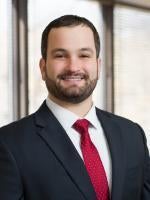A recent unpublished appellate decision shows how difficult it is to convince a court to pierce the corporate veil—even when the individual owner admitted he had dissolved the corporation in order to avoid paying the creditor’s claim. Port Drivers Federation 18, Inc. v. Fortunato, Docket No. 1-2096-15T4 (App. Div. Mar. 31, 2017).
Defendant Fortunato (“Fortunato”) was the sole shareholder of two corporations, All Saints Express, Inc. (“All Saints”), a federally registered motor carrier, and St. George Trucking and Warehouse (“St. George”), a bonded warehouse used for shipments from the ports of New York and New Jersey. All Saints hired independent owner-operator drivers, and St. George contracted with All Saints to transport freight to and from the warehouse. All of the drivers had a sign on their vehicles acknowledging that they worked for All Saints. All Saints had no official place of business or offices and, other than Fortunato, did not have any directors, officers or employees. Fortunato did not draw a salary or receive any profits distributions, bonuses or dividends from All Saints.
In a prior federal action, Port Drivers, an organization of owner-operators, had sued All Saints and St. George for violations of federal motor carrier laws. The federal court granted summary judgment to Port Drivers on the violations but it rejected the claim that St. George was an alter ego of All Saints. The court found that All Saints was grossly undercapitalized, did not pay dividends, was dependent on a weekly cash infusion from St. George, and did not have a functioning board of directors. Nevertheless, the court found there was nothing to show that All Saints operated as a mere instrumentality of St. George or that St. George was using All Saints to perpetrate a fraud or an injustice, or to circumvent the law. Port Drivers was awarded attorneys’ fees and costs of $278,837 on its claim, but it could only recover $11,774 from All Saints.
Port Drivers then filed a New Jersey state court action to recover the amount from Fortunato personally, alleging that All Saints was his alter ego. The trial court granted summary judgment to Fortunato, however, in a 2015 unpublished decision, the Appellate Division reversed, finding “the record shows that All Saints had no corporate formalities,” and that Fortunato “allegedly gave orders that checks should be written directly to him.” It also noted “evidence exists that [Fortunato] may have used All Saints to avoid complying with the judgment,” including that, after the entry of the judgment, Fortunato received at least $11,000 from All Saints and All Saints transferred a $140,000 account receivable to St. George. According to the panel, these facts created a triable dispute as to whether Fortunato used All Saints to circumvent the law. Following a remand, the trial court conducted a bench trial to resolve those factual issues.
At the trial, the parties presented proofs about how All Saints and St. George operated, including the facts recited by the Appellate Division. Fortunato admitted that, shortly after the entry of the judgment, he had dissolved All Saints and wound up its affairs, and that he had authorized a St. George employee to write two checks totaling $11,000 from an All Saints banking account directly to him. Fortunato testified that, other than this small amount, any retained earnings that All Saints had accumulated prior to the judgment had been used to pay its legal fees. The trial court concluded that none of this evidence showed that Fortunato had personally used All Saints for an improper purpose.
On appeal, the Appellate Division agreed, holding that Fortunato’s actions in the wake of the judgment—dissolving All Saints and taking $11,000 from its bank account—did not show fraud, injustice or circumvention of law. The appellate judges (neither of whom sat on the 2015 panel) accepted the trial judge’s conclusion that Fortunato had the right to dissolve All Saints simply because he did not want it to pay the judgment. The court cited approvingly the trial court’s reasoning that “‘[d]eciding that a business can no longer achieve the aims that led to its formation’ was not proof that defendant sought to perpetrate a fraud or circumvent justice.” As for Fortunato’s withdrawal of money from All Saints after the judgment, the court agreed with the trial judge that “the distribution of the $11,000 to defendant did not prove anything other than wrapping up normal business affairs.”
Reading Port Drivers, one can fairly question why the earlier Appellate Division panel believed these same facts could be enough to support an alter ego claim. Moreover, the Appellate Division’s short opinion did not expand on its reasoning. Would the decision have been the same if Fortunato had taken a larger amount out of the company before dissolving it? Would the result be the same for any owner who dissolves a company to avoid having the corporation pay a large judgment? These questions no doubt will be answered in later decisions. One thing Port Drivers makes clear is that, even where the facts seem strongly supportive of a veil piercing claim, courts are extremely reluctant to impose alter ego liability.




 />i
/>i

